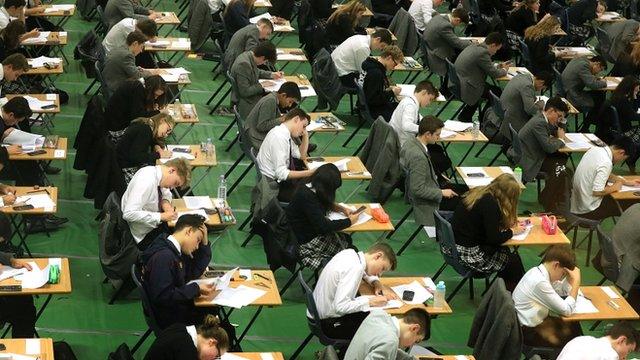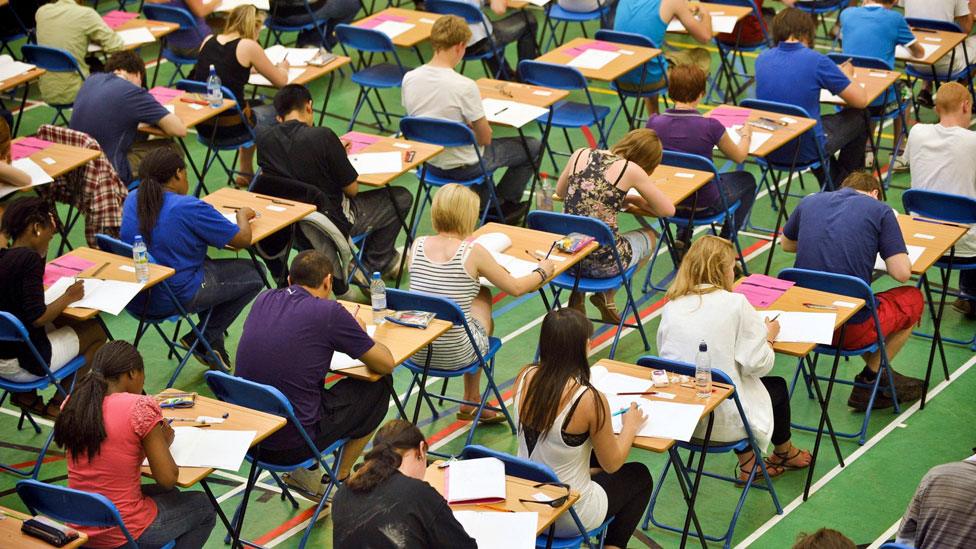GCSEs 'need tougher pass mark to catch international rivals'
- Published
- comments

Teenagers will be getting results from new-style GCSE exams this week
Pass marks for GCSEs in England need to be pushed upwards to catch up with high performing education systems in Asia, say researchers from the Education Policy Institute.
GCSE results are being changed to grades 9 to 1, with the first such grades to be published this week.
But there will be two different pass marks - grade 4 as a "standard" pass and grade 5 as a "strong" pass.
Researchers say pupils need to be at grade 5 to match global rivals.
The study from the Education Policy Institute says England's school system faces an "immense challenge" if it is going to match the levels of achievement in countries such as Singapore, South Korea, Hong Kong and Japan.
Higher aspiration
GCSEs in England are being made more challenging and will be decided by final exams rather than coursework, with the first results of these new-style GCSEs being published for English and maths this week.
These will be graded from 9 to 1, with a grade 4 being counted as a "standard" pass, similar to a grade C.
But the researchers say that on average pupils should be achieving a "strong" pass at grade 5, if England is going to keep up with international competitors.
At present, the researchers say, only 40% of pupils in state schools have reached this "world-class standard".
To keep up in maths, the study says, it would require an increase of over a third of pupils getting top grades and an average above grade 5.
"The old C grade is not an adequate national aspiration if England wants to compete with top education nations," says David Laws, former Education Minister and executive chairman of the Education Policy Institute.
"This analysis highlights the gulf between education outcomes in England and the performance of the world's best education nations," he said.
"In certain subjects, such as maths, England needs both to significantly raise the number of top performers and almost halve the number of low performers if it is to compete with the world's best."
Paul Whiteman, leader of the National Association of Head Teachers said: "This report shows that England's obsession with structural change, under a succession of governments, has had little impact on either standards or equity.
"Policy makers have routinely pursued the wrong priorities," said Mr Whiteman.
"The highest performing school systems are those that invest in their teachers and that respect and value education."
Kevin Courtney, leader of the National Union of Teachers, said that even if the overall results at national level were kept in line with previous years, individual schools "will still experience volatility in their results".
He warned that such volatility could have "unfair consequences".
There have been warnings about confusion over having two pass grades - with universities using different versions of a pass in their entry requirements.
Education Secretary Justine Greening had explained the plans for two pass grades to the education select committee earlier this year.
"I want to provide certainty about how this new grading will work and, in particular, the consequences for individual pupils of achieving a grade 4 or grade 5," Ms Greening had written to the committee chairman.
"Rather than reporting on the "good pass", we will instead distinguish between a grade 4 as a "standard pass" and a grade 5 as a "strong pass" and report on both."
A Department for Education spokesman said: "We know there is more to do and this report underlines the importance of our reforms to create new gold-standard GCSEs, benchmarked against the best education systems in the world so young people learn the knowledge and skills that will allow them to compete in an increasingly global workplace."
- Published22 August 2017

- Published28 June 2017

- Published17 April 2017
